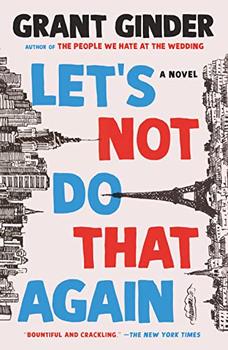Summary | Excerpt | Reading Guide | Reviews | Beyond the Book | Readalikes | Genres & Themes | Author Bio

A Novel
by Grant GinderThe champagne has gone to her head.
Also, there's the problem of the smoke. It's everywhere. The smell of burning wood and plastic assaulting her nostrils; the crisp static of smoldering embers. It's raining, but that hardly helps: fires spill from the storefronts along the avenue. Flames outside of Bulgari; singed mannequins at Hugo Boss and Lacoste. A bank with smashed windows, turned into an open-air theater. Shirts with their tags still on them strewn across the street.
She finds herself part of an organized and slow-moving chaos. Protesters creep up the Champs-Élysées, their jackets slick with rain, until the police, feeling as if they've been too generous, force them to relinquish ground. This is how it works, how it surges. Two steps forward, one step back. The sea as the tide rises, climbing over shells on a long stretch of beach. Some of them wear gas masks that make them appear alien, insectile, and those who do not wrap their faces with handkerchiefs and scarves. A strip of wool bearing the logo of Paris Saint-Germain, or—in her case—a square of silk from Hermès. Often, she sees the marchers—patriots to some, terrorists to others—stop to take selfies. Here we are, and here France burns, their smiles say, and when they are finished, they march on. They dodge giant hoses and sing. They balance their lit cigarettes behind their ears so they can use both their fists.
They inch closer toward the Arc de Triomphe and, from behind police barricades, tear gas cannons pop like so many corks. The mob's anatomy is the structure of an atom: at the center is a tight nucleus, around which orbits a wild tangle of electrons. She is one of those orbiters—she could be eighteen, but she could also be thirty; the smoke smudges out her years, adding lines where there shouldn't be lines while stealing others away. She wears a black Chanel dress and a pair of Adidas trainers, and in her right hand she holds a half-full bottle of champagne. Beneath her silk scarf she's smiling, but it's a different smile from the others; hers is not wild and tenacious but rather curious. The mild surprise of someone who's just woken up from a long summer nap. She reads some of the signs around her, and joins in some of the chants, but after a few minutes she gets restless, bored. She takes another swig of the champagne and drifts farther away.
Two people follow her—the first, a camera operator from a French news station, the second, a handsome man with full brown hair. They track her as she crosses avenue George V and stops—finally—beneath the bloodred awnings of Fouquet's. The girl looks at the man with the camera, then up at the iconic restaurant—This, she seems to be saying to him, is the spot. Bits of marble lie at her feet, the detritus of a facade that used to stand here or on the grands boulevards, scabs picked from the face of Paris. She crouches down to touch them, and for a pure, crystalline instant, the sounds of the avenue quiet and the world calms: here is a girl, her hair in her face, running her fingers along the smooth edge of a stone. But then, on rue de Bassano, there is the wail of a siren. Close and high and loud, like the screech of bombers grazing tops of trees.
The girl stands up and whips her head around. She waits for the siren to fade, and once it does she looks down at the champagne, as if she suddenly remembers she is holding it. With her head tilted back, she finishes what's left of the bottle. Then, she hurls it as hard as she can through the front window of Fouquet's.
Glass shatters; a waiter screams. Her hands now freed, the girl searches her pockets for a cigarette.
The camera coaxes her into focus and, beside it, the handsome man laughs.
"Greta!" he shouts. "Give me a smile!"
Excerpted from Let's Not Do That Again by Grant Ginder. Copyright © 2022 by Grant Ginder. Excerpted by permission of Henry Holt and Company. All rights reserved. No part of this excerpt may be reproduced or reprinted without permission in writing from the publisher.
Some books are to be tasted, others to be swallowed, and some to be chewed on and digested.
Click Here to find out who said this, as well as discovering other famous literary quotes!
Your guide toexceptional books
BookBrowse seeks out and recommends the best in contemporary fiction and nonfiction—books that not only engage and entertain but also deepen our understanding of ourselves and the world around us.